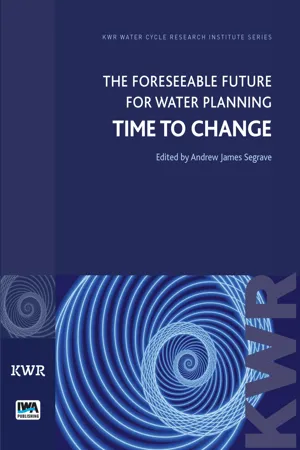
- 144 pages
- English
- PDF
- Available on iOS & Android
eBook - PDF
About this book
People and societies conceptualise and experience time in fundamentally different ways. This basic aspect of perception significantly influences the way we frame problems and conceive solutions.
This book shows how time perspectives differ across national cultures and across professional roles. It shows how these differences generate ambiguity when it comes to defining problems and devising solutions in the water sector. This is especially important when dealing with problems such as Sustainable Water Resources Management and Climate Change that involve (culturally and professionally) diverse stakeholders. Response strategies to such problems inherently require concerted action because of the large spatial and temporal scale on which they take place and to minimise the occurrence of conflicting interventions. This disparity between diverse problem perceptions and the need for collective understanding and united action is increasingly recognised as an important concern in the field of water resource management.
The conclusions are important because the time horizons considered in planning and setting research agendas influence what problems are perceived, what questions are asked, and what solutions are sought. In general, more time needs to be invested in framing problems. This is particularly important for participatory planning and transdisciplinary research where the diversity in Motivational Space is greatest. It is recommended that Motivational Space be collectively and explicitly framed from the outset of all planning projects, especially in terms of Temporal Extent. When it comes to setting research agendas it is important to match the Motivational Space of those who prioritize the questions with the goal of the research programme.
Author: Andrew James Segrave, KWR Watercycle Research Institute, Utrecht, The Netherlands
Frequently asked questions
Yes, you can cancel anytime from the Subscription tab in your account settings on the Perlego website. Your subscription will stay active until the end of your current billing period. Learn how to cancel your subscription.
No, books cannot be downloaded as external files, such as PDFs, for use outside of Perlego. However, you can download books within the Perlego app for offline reading on mobile or tablet. Learn more here.
Perlego offers two plans: Essential and Complete
- Essential is ideal for learners and professionals who enjoy exploring a wide range of subjects. Access the Essential Library with 800,000+ trusted titles and best-sellers across business, personal growth, and the humanities. Includes unlimited reading time and Standard Read Aloud voice.
- Complete: Perfect for advanced learners and researchers needing full, unrestricted access. Unlock 1.4M+ books across hundreds of subjects, including academic and specialized titles. The Complete Plan also includes advanced features like Premium Read Aloud and Research Assistant.
We are an online textbook subscription service, where you can get access to an entire online library for less than the price of a single book per month. With over 1 million books across 1000+ topics, we’ve got you covered! Learn more here.
Look out for the read-aloud symbol on your next book to see if you can listen to it. The read-aloud tool reads text aloud for you, highlighting the text as it is being read. You can pause it, speed it up and slow it down. Learn more here.
Yes! You can use the Perlego app on both iOS or Android devices to read anytime, anywhere — even offline. Perfect for commutes or when you’re on the go.
Please note we cannot support devices running on iOS 13 and Android 7 or earlier. Learn more about using the app.
Please note we cannot support devices running on iOS 13 and Android 7 or earlier. Learn more about using the app.
Yes, you can access The Foreseeable Future for Water Planning by Andrew James Segrave in PDF and/or ePUB format, as well as other popular books in Technik & Maschinenbau & Umweltwissenschaft. We have over one million books available in our catalogue for you to explore.
Information
Table of contents
- Cover
- Contents
- Biographical Note
- Acknowledgements
- Summary
- Chapter 1: Introduction
- Chapter 2: Interpretive framework
- Chapter 3: A new method
- Chapter 4: An empirical study in Brazil, Ghana, Japan and the Netherlands
- Chapter 5: Mapping international ambiguity in Problem Space
- Chapter 6: Conclusions, implications and applications
- References